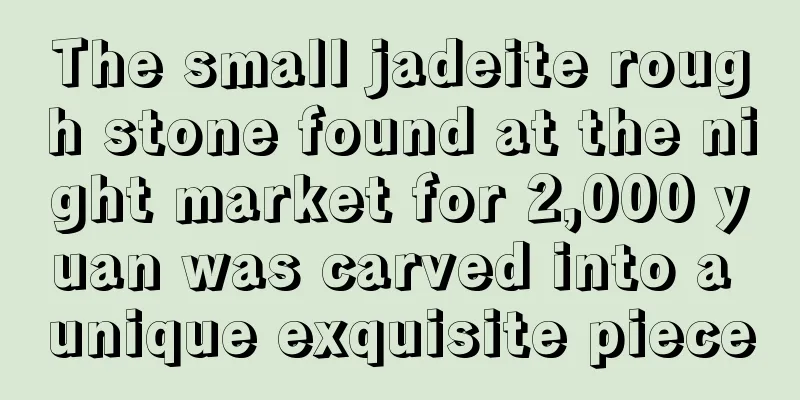How much do you know about the 6 jade carving techniques of jade?

|
Jade is usually judged by its "type, water, color, texture, and workmanship". Among them, "type, water, color, and texture" are generally based on the quality of the jade itself, while the craftsmanship and workmanship of jade have a very large impact on the jade itself. The jade carving skills also directly affect the final presentation of jade, whether it is the finishing touch or a waste of time. Therefore, for finished jade products, the quality of craftsmanship also plays a very important role, especially our country's jade carving technology, which has a long history. The craftsmanship, especially China's jade carving technology, has a long history, superb technology, and different styles. It is also known as the "wonder of oriental art." So how much do you know about jade carving? Next, let’s talk about 6 common jade carving techniques. 01. Round Sculpture A round sculpture is also called a three-dimensional sculpture, which can be appreciated from different directions and angles. Because round sculptures are extremely three-dimensional and have distinct main bodies, they require sculptors to carve in an all-round and multi-dimensional manner, which places very high demands on the sculptor's technical level. 02. Relief Relief refers to the process of shaping or carving an image on a carved flat base by compressing the thickness while maintaining the original length-to-width ratio. The shape outline is similar to that of a painting, with varying degrees of concavity and convexity and no restrictions on form. 03. Openwork Openwork carving, also known as hollow carving, is a further development of relief carving. On the basis of relief carving, the background part is hollowed out to make the outline of the carved image clearer, reflecting the exquisite and delicate artistic effect. Openwork carving makes jade carvings have distinct layers, with patterns and scenery interacting up and down, and looking different when near and far. However, the craftsmanship is complicated, the production cycle is long, the difficulty coefficient is high, and it is time-consuming and labor-intensive, but the effect presented is absolutely the best. 04. Beautiful Color Using the natural color and texture of jade to carve it in a way that suits the jade material is called "Qiao Se". Color matching is a special expression method in jade carving, which can integrate the design and dark color of the work, making the work more vivid and real, giving people a lifelike and vivid feeling, and is deeply loved by everyone. 05. Turn flaws into virtues Jade is created by nature and will inevitably have some flaws, so there is a saying in the industry that "jade cannot be made without flaws." Flaws are taboo in jade, but in order to make full use of the jade and avoid waste, there are techniques to “turn flaws into virtues”, and avoiding carving is one of them. The masterpieces designed through this technique will not only not affect their quality, but will also add the finishing touch. 06. Turning waste into treasure The purpose of clever use of waste materials is to cherish jade resources, reduce the cost of works, and use scraps to create jade carvings with the same or higher value than finished jade materials. Jade is a precious non-renewable material, so jade carvers all adhere to the principle of cherishing materials, and the technique of cleverly using waste materials is even more rare. fcgc66 fcpf18 |
<<: How do you evaluate the Jade Buddha?
>>: Revealing the secrets of hand-carved jadeite
Recommend
How to choose and buy emerald violet? The darker the purple, the higher the value; the lighter the purple, the lower the value
First, look at the color. The richer the purple, ...
Investment and Collection of Jadeite
Now let’s discuss with you the topic of jade inve...
Remember the investment principles of jadeite!
Jade was extremely precious in ancient times and ...
Teach you to identify A, B, and C jade in minutes, don't be deceived by unscrupulous merchants
Jade A grade That is, pure natural jade, without ...
Jade carvers use red jade to carve four famous caves. It turns out that jade with skin color is so beautiful.
The work is carved with red jadeite, which is bri...
Jade appreciation often falls into seven misunderstandings, and insiders are confused
The traces of time left on jade cannot erase peop...
I bought a pitifully small piece of jadeite raw stone for 8,000 yuan, but the finished product was so eye-catching!
This piece of raw stone is very small, only 350 g...
What are the characteristics of Suyang jadeite? Why is it so popular?
If you have any knowledge of jade carving, you mu...
Violet Spring Jade, a spring color like blooming cherry blossoms
Violet and spring-colored are the most magical of...
The value of jadeite has skyrocketed! Which type of jade has the most investment potential this year
As the saying goes: Hide gold in troubled times a...
Common identification methods of jadeite
Jade is known as the king of jade. Chinese people...
Jade ring faces are expensive. When we buy them, we need to pay attention to these 5 points
In the jade market, I believe everyone has heard ...
A Clear Stream in the Jade World - Blue Water Jade
The beauty of jade is natural. It has gone throug...
There are 7 grades of jadeite. Do you know them all?
Jade has always been regarded as a treasure by pe...
There is a lot of story behind the Jade Buddha, how to choose is the key
Jade Buddha is a kind of jade that many friends l...









